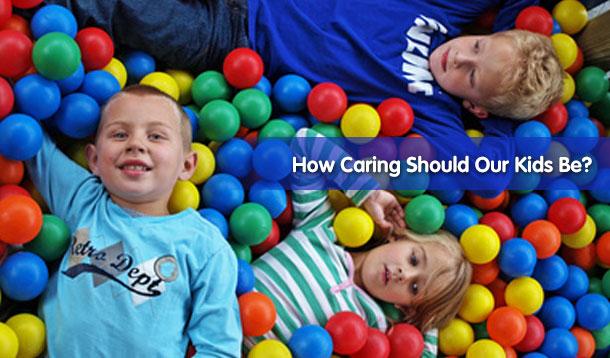
Last weekend, I took the kids to Little Monkeys with one of their friends.
For those not living in the Oakville/Burlington area, Little Monkeys is an indoor play area where kids go to burn serious rubber, climbing frantically up and down a giant jungle gym, while parents find an hour to faint on big comfy couches.
As part of the experience, the kids usually spend some time playing at the game centre (aka: Kid Gambling Zone), where they play arcade games, win tickets, and redeem them for toys and such.
While walking around with his tickets, my 9-year-old son was stopped by a similar aged kid, and after a quick exchange, my son handed the other kid a heap of his tickets. The kid took the tickets and walked away.
I called my son and asked him about what happened, and he explained that the kid asked him for some tickets, so he gave him some. I asked if he knew him, and he said no, but he explained that he was just being nice to him. He then went back to playing.
I thought about my son’s answer amidst mixed emotions. On one hand, I was obviously happy about his very kind gesture, which didn’t come as a surprise at all. My son had recently won the most caring student award in his class, for a second year.
However, on the other hand, and being the caring sensitive kid he is, he was also starting to face frequent bullying issues with a few classmates. At one point, his mom and I had to interfere and work with his teacher to manage the situation.
During that same visit to Little Monkeys, another incident happened. This time, a girl came and snatched a giant inflatable crayon my daughter had won. I asked my son to go get it back, he hesitated, and, instead, his friend walked straight to the kid, snatched the crayon from the girl’s hand, and walked back without giving it a second thought.
So, how caring should our kids be? How kind is too kind?
I definitely want my kids to be in touch with their inner humanity. I want them to give selflessly to their friends and community, where and when needed. I want them to care about the feelings and needs of others. But at the same time, I don’t want them to live for pleasing others.
After spending the evening debating it all in my head, I decided to have a conversation with my son about it.
I started by stating how proud I was of his selfless act, especially when he didn’t know the kid. I then went on explaining to him that even when we do good without expecting anything in return, what goes around usually comes around. Life will always find a way to repay our good deeds.
I then asked my son a simple question: “Why did you do it?”
He thought a little, and then said, “Because it’s a good thing to do.”
“But why did you feel compelled to do a good thing to a total stranger?”
“Because it would make him happy.”
“And why did you want to make him happy?”
“Because people like it when I help them.”
I paused to think. I wanted to make sure I allowed him to be himself. The last thing I want is to plant my 40-year-old philosophies in my 9-year-old son’s head.
After a short pause, I said, “I think that’s a great reason to help people. As long as you do it because it feels good to you, then you should keep doing it.”
“However,” I continued, “don’t do it only to make people like you. People should love you for who you are, not what you do, and there are a million and one reasons why people would love you!”
He said, “I understand.” We hugged and he went back to his world of video games.
After our short conversation, I couldn’t help but wonder if I had just abducted my son and taken him on a journey of the meaning of reciprocity too soon? Should I have left him to his own devices and allowed him to learn from his own experiences—especially the ones that I know will hurt him?
Should we allow our kids to navigate the many disappointments life will undoubtedly throw their way until they find the right balance between giving and getting? The one that best suits them? Or do they need our close guidance distinguishing between selfishness and self-interest? Filling their own life tank vs. filling other's.
Have you recently had similar tough conversations with your kids? What did you learn from them? Would love to hear from you.
If you liked this, you might also like: "Have You Ever Unintentionally Made Your Child Afraid?" and "The Most Important Conversations To Have With My Daughter."